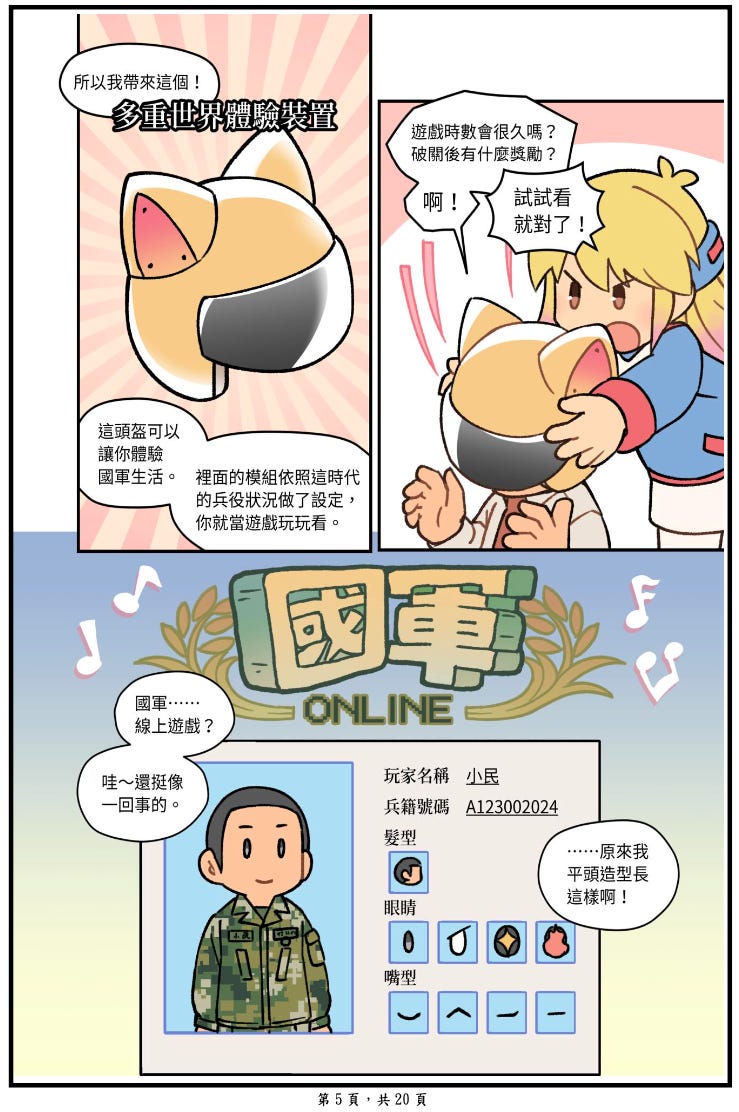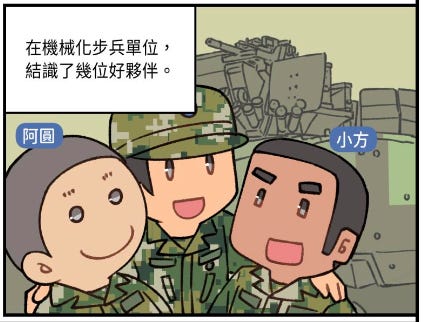Manga Makeover for Taiwan Conscription
Serious kudos to the Taiwan Ministry of Defense for their anime skills.
This piece was authored by Karson Elmgren.
It’s no secret that Taiwan’s mandatory military service is, well, kind of a joke. In the words of one recent conscript: “I feel like if one day I really have to go into battle, based on my military training, I will just die.”
As one step to fix that, the Tsai Ing-wen administration is increasing the conscription period from four months to one year, effective 2024. And because this is Taiwan, the Ministry of Defense released a twenty-page manga — Japanese-style comics — to explain the change to a less-than-fully enthusiastic audience of young men.
It’s actually pretty good.
First things first: it looks nice! They hired a design and illustration team that young people would voluntarily consume, an approach which should not be underestimated.
The story is also surprisingly poignant for what is literal military propaganda and factsheets. It also seems important that, after starting off with some brief but compelling context for why longer military service is well-justified, the bulk of the manga focuses on laying out (a certainly idealized version of) the experience conscripts can expect to have, helping reduce inevitable anxieties about spending a good chunk of your youth in barracks. China, and the threat of invasion, is mentioned only once, at the very beginning; it’s probably better not to linger on that.
Of course, what matters here is how it will resonate with young Taiwanese men. To be sure, I am not Taiwanese — but at least from my perspective, I can’t imagine the US Department of Defense putting out anything nearly this good.
For those who can’t read Chinese, here’s a quick runthrough:
First, we meet Xiaomin (a nickname playing on 民 mín, which means “the people” or “civilian”), a new conscript who is hesitant to fulfill his national duty. After asking why he has to serve one year while his older brother served just four months, he learns:
China has never renounced the use of force against Taiwan;
South Korea and Israel both have mandatory military service that’s even longer;
the Ukraine-Russia war shows the value of national defense and resilience;
Taiwan is defending its democracy and freedom.
And you — yes you, Xiaomin — play a critical role in that defense.
A girl from the future (dressed in the colors of the ROC flag) shows up because “vibrations in spacetime” have endangered her timeline, or something. It’s kind of implied that these vibrations are caused by Xiaomin’s (shall we say) wavering commitment to military service.
Fortunately, she has just the thing to mitigate his anxieties about the transition to military life: a VR helmet which of course has cat ears. Again, Taiwan.
Through the VR helmet, the conscript gets a taste of what awaits him: he designs his avatar, levels up with a quick training montage, and chooses which class of character he will be sorted into — all along the way accompanied by a charming and supportive “System Goddess” named Yaya.
Using video-game tropes, in my view, is a smart move here: it leverages a familiar cultural script of actively constructing an alternate self — even an idealized self — to inhabit for a time, framing military service as a process of proactive self-reinvention, rather than an obligation imposed upon you by the state (regardless of which characterization is more factually accurate).
After our hero returns to reality, he enlists in active service, and we run through some logistics: assignment process, stipend disbursement (about US$850 per month, a massive increase from $210 previously), holidays, and so on.
We also get a couple new friends in the tank brigade with nicknames that, of course, match the shape of their heads: 阿圓, basically “Roundy,” and 小方, “Lil’ Square.”
While on holiday, our hero ends up using his new first-aid skills to help a woman harmed in a car accident who looks suspiciously like System Goddess Yaya (Xiaomin also gets called out by his friend for his lack of rizz when he tells her this).
Naturally, they fall in love, get married after he finishes his year of service, and live happily ever after.
The story wraps up poignantly — in a manner somewhat reminiscent of Ted Chiang’s The Merchant and the Alchemist’s Gate — when Xiaomin meets his great-granddaughter Xiaowen, who turns out to have been the time traveler who came to boost his courage when he was a teenager. They pinky promise on Xiaowen’s trip back in time, and it is revealed that Xiaowen specifically designed the System Goddess to look like the woman Xiaomin would go on to marry. (We also get a vision of a twenty-second-century Taipei skyline, with a recognizable Taipei 101 nestled among many other mega-tall structures.)
The manga closes by circling back to the beginning: Xiaowen is seen stepping through the time machine and placing an affectionate hand on newly conscripted Xiaomin’s shoulder — as well as, figuratively, the reader’s shoulder — in both a call to service and an expression of gratitude for a future protected.









